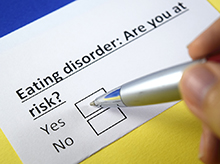
Eating disorder (ED) is a form of psychiatric illness associated with an abnormal fear of weight gain and feelings of fatness. It has been proposed that emotional distress is directly linked to higher risks of eating disorders. A recent study on 168 ED patients investigated the effect of different cognitive-affective variables, e.g. depression, anxiety, guilt, and whether these variables could predict symptoms of ED. It was reported that depression contributed most to the progression of ED, as depressive individuals were more prone to feelings of fatness and fears of weight gain. Moreover, negative evaluation is another factor that poses significant stress on ED patients, which further increases their fears. Hence, it is suggested that future treatments of ED should target depression or other emotional comorbidities to reduce feelings of this affective state. Further research can also be done to examine underlying mechanisms of how depression causes symptoms of ED.
Keywords: Eating disorder, depression, fatness, weight gain
Reference
Levinson CA, Williams BM, Christian C. J Affect Disord. 2020;277:146-152.





